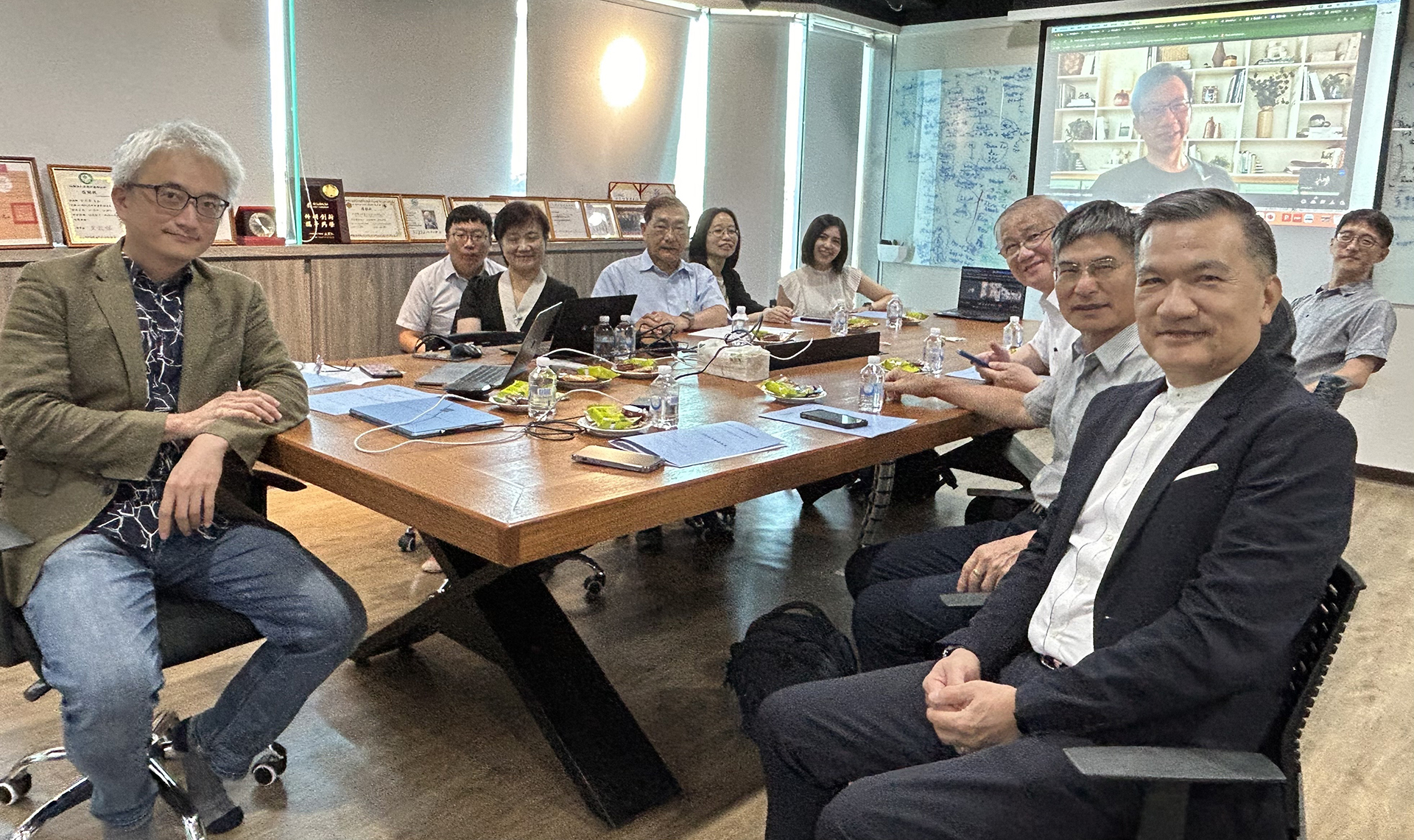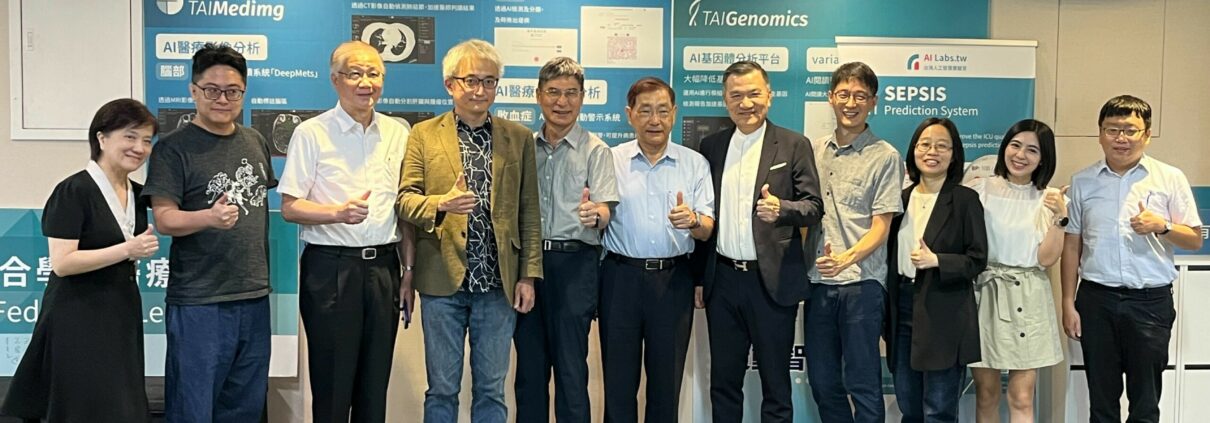Taiwan AI Development Foundation Announces Re-Election of Board Members
Photo Caption: A group photo of the second and third board members of the Taiwan AI Development Foundation. From left to right, starting from the second person: Hung-Yi Lee, Pan-Chyr Yang, Yi-Chin Tu, Liang-Gee Chen, Tsung-Ching Wu, Chen-Wei Wang, Yi-Hsuan Yang, Chien-Yu Chen, and Yun-Nung Chen.
[Taipei, Taiwan, July 24, 2024]This week, Taiwan AI Labs conducted its board re-election, inducting four distinguished leaders into its third board: Pan-Chyr Yang, Liang-Gee Chen, Tsung-Ching Wu, and Chen-Wei Wang. These figures hail from diverse fields, including healthcare, technology R&D, venture capital, and industrial transformation.
Yi-Chin Tu, Chairman and founder of Taiwan AI Labs, emphasized that generative AI is steering global industrial transformation. He highlighted Taiwan’s role in the international AI landscape as more than just a provider of computing power. This year, Taiwan AI Labs has engaged with multiple international organizations, championing the global deployment of trustworthy and responsible AI technology. The new board members are esteemed global industry leaders, poised to spearhead the practical application of AI across various sectors.
Eminent Figures Converge to Advance AI Industry Applications
Among the newly elected board members, Chen-Wei Wang, former CEO and General Manager of Quanta Computer, is a significant influencer in the tech industry. His expertise in expanding Quanta’s global reach will accelerate the integration of AI into Taiwan’s industrial sector. Tsung-Ching Wu, with 35 years of experience in Silicon Valley’s semiconductor industry, is renowned for nurturing technological innovation teams and is an ideal mentor for AI startups.
From the government and academic sectors, Liang-Gee Chen, as the Minister of Science and Technology in 2017, was the pioneer in transitioning Taiwan’s tech industry mindset from OEM to an AI-centric strategy. His initiatives were instrumental in the establishment of AI labs and other projects, significantly contributing to Taiwan’s AI strategy.
In the medical field, academician Pan-Chyr Yang has been a vanguard in merging healthcare with technology. In collaboration with Taiwan AI Labs, he established the Taiwan Clinical Trial Consortium (TCTC) for specific diseases, advancing medical federated data governance and the Taiwan Federated Learning Healthcare Alliance. He is a key advocate for AI alliances in Taiwan’s healthcare sector.
The new board also features leading scholars such as Hung-Yi Lee and Yi-Hsuan Yang, both professors in the Department of Electrical Engineering at National Taiwan University (NTU), specializing in AI and its intersection with humanities, arts, and music. Yun-Nung Chen, an associate professor in the Department of Computer Science and Information Engineering at NTU, is an expert in large language models. Cheen Liao, co-founder of Synology and Taiwan AI Labs, brings extensive international experience in large-scale data processing and continues to serve the foundation.

Photo Caption: Second-term board members, including Lin-Shan Lee, an honorary professor in the Department of Electrical Engineering at NTU, retired due to personal career planning. Chien-Yu Chen, a professor in the Department of Bio-Industrial Mechatronics Engineering at NTU, retired after her term ended due to her new role as department chair. Yi-Chin Tu presented certificates of appreciation to honor these distinguished scholars for their significant contributions to the AI field.
Future Vision: FedGPT for Public Health, Industry Applications, and Cognitive Resilience
Ethan Tu outlined the next objectives of Taiwan AI Labs, aiming to address Taiwan’s AI transformation challenges and set a global example.
First, acting as a bridge for expanding international cooperation between Taiwan’s public and private sectors, Taiwan AI Labs will provide innovative R&D technologies and talents from the private sector, aiding AI industry innovation. Simultaneously, it will prevent AI misuse, enhance cognitive warfare detection and response, and bolster societal resilience.
Second, in alignment with the national vision of “Healthy Taiwan,” Taiwan AI Labs will utilize a federated learning platform to establish national-level federated health data, integrating medical genetics and various body characteristics. This initiative aims to contribute to international precision medicine while scientifically resolving Taiwan’s long-standing ancestral heritage and cultural roots controversies.
Currently, over 80% of medical centers in Taiwan are partners with Taiwan AI Labs on the federated learning platform. Ethan Tu emphasized that the core principle of federated learning is “data remains in place, alliances share results, and establish trustworthy and responsible AI.” This approach reduces model training costs and protects patient data privacy.
In the era of generative models, Yun-Nung Chen led the NTU team, in collaboration with Taiwan AI Labs and other partners, to successfully open-source the TAME general model for various industries. Yi-Hsuan Yang developed artistic and music models for film and multimedia, with results presented at the International Society for Music Information Retrieval (ISMIR) conference.
Taiwan AI Labs has expanded to become an enterprise-specific federated generative platform, integrating industry needs to create custom FedGPTs for enterprises. Addressing alliance needs in healthcare, finance, and multimedia, the foundation aims to build professional GPTs to enhance industry competitiveness.
Addressing Taiwan’s Major Industry Issues
The board of the Taiwan AI Development Foundation also discussed Taiwan’s current industry development needs and the international challenges of AI regulation, including data privacy and legal issues.
Pan-Chyr Yang highlighted that while Taiwan’s healthcare industry aims to promote smart healthcare, it faces difficulties in acquiring medical data, which, if unresolved, could make Taiwan a “digital colony.” He suggested that the foundation actively assist various fields in Taiwan to establish federated data agencies, utilizing AI technology to standardize industry data and implement data governance based on trust and responsibility, thereby paving the way for a more innovative future for Taiwan’s AI applications in healthcare and other technologies.
Chen-Wei Wang emphasized that AI applications will be essential for all industries in the future. He recommended starting with industries that can quickly convert to commercial value, establishing models that can then be replicated within the same industry and beyond. He will work with Taiwan AI Labs to discuss future industry policies.
Tsung-Ching Wu stated that trustworthiness is Taiwan’s AI advantage and foundation. Taiwan AI Labs and its alliances will promote open model licensing, allowing the foundation and alliance to receive industry feedback, accelerating development, and ensuring sustainable growth for the foundation and its member industries.
Liang-Gee Chen proposed that Taiwan should adopt an “AI Foundry” model. By positioning the foundation and its alliances as the AI design house for the global industry, Taiwan can emulate the chip industry by vertically integrating its “software-led hardware” application advantages. This approach aims to establish Taiwan as the model provider for leading global AI application companies, continuously leading and participating in the rapid growth of global high-tech.



